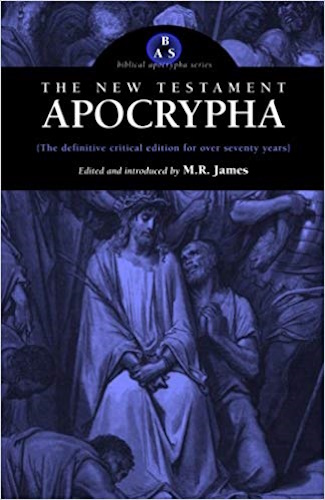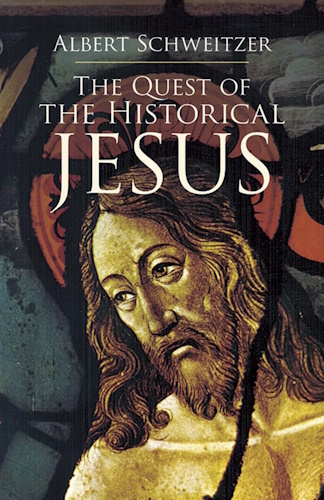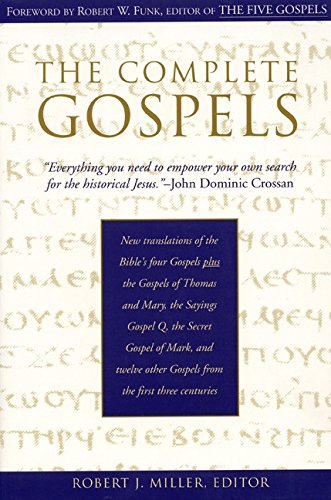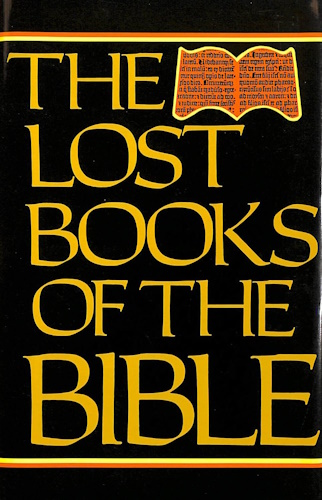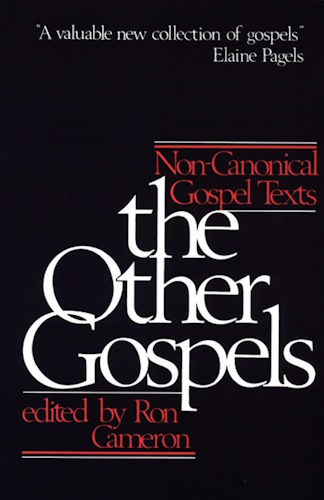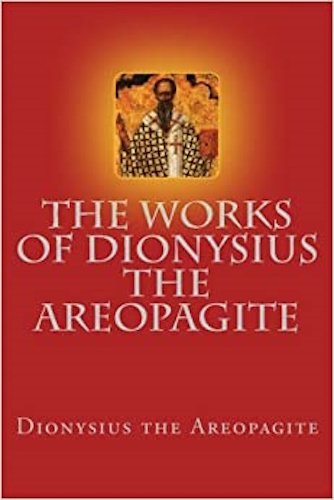
The works of Dionysius the Areopagite
Mystic Theology
page 129
PREFACE TO MYSTIC THEOLOGY.
MYSTIC THEOLOGY is like that ladder set up on the earth whose top reached to Heaven on which the angels of God were ascending and descending, and above which stood Almighty God. The Angel ascending is the "negative" which distinguishes Almighty God from all created things. God is not matter—soul, mind, spirit, any being, nor even being itself, but above and beyond all these. The Angel descending is the "Affirmative." God is good, wise, powerful, the Being, until we come to Symbolic Theology, which denotes Him under material forms and conditions: Theology prefers the negative because Almighty God is more appropriately presented by distinction than by comparison.
page 130What is the Divine Gloom?
SECTION I.
TRIAD supernal, both super-God and super-good, Guardian of the Theosophy of Christian men, direct us aright to the super-unknown and super-brilliant and highest summit of the mystic Oracles, where the simple and absolute and changeless mysteries of theology lie hidden within the super-luminous gloom of the silence, revealing hidden things, which in its deepest darkness shines above the most super-brilliant, and in the altogether impalpable and invisible, fills to overflowing the eyeless minds with glories of surpassing beauty. This then be my prayer; but thou, O dear Timothy, by thy persistent commerce with the mystic visions, leave behind both sensible perceptions and intellectual efforts, and all objects of sense and intelligence, and all things not being and being, and be raised aloft unknowingly to the union, as far as attainable, with Him Who is above every essence and knowledge. For by the resistless and absolute ecstasy in all purity, from thyself and all, thou wilt be carried on high, to the superessential ray of the Divine darkness, when thou hast cast away all, and become free from all.
page 131SECTION II.
But see that none of the uninitiated listen to these things—those I mean who are entangled in things being, and fancy there is nothing superessentially above things being, but imagine that they know, by their own knowledge, Him, Who has placed darkness as His hiding-place. But, if the Divine initiations are above such, what would any one say respecting those still more uninitiated, such as both portray the Cause exalted above all, from the lowest of things created, and say that It in no wise excels the no-gods fashioned by themselves and of manifold shapes, it being our duty both to attribute and affirm all the attributes of things existing to It, as Cause of all, and more properly to deny them all to It, as being above all, and not to consider the negations to be in opposition to the affirmations, but far rather that It, which is above every abstraction and definition, is above the privations.
SECTION III.
Thus, then, the divine Bartholomew says that Theology is much and least, and the Gospel broad and great, and on the other hand concise. He seems to me to have comprehended this supernaturally, that the good Cause of all is both of much utterance, and at the same time of briefest utterance and without utterance; as having neither utterance nor conception, because It is superessentially exalted above all, and manifested without veil and in truth, to those alone who pass through both all things consecrated
page 132
and pure, and ascend above every ascent of all holy summits, and leave behind all divine lights and sounds, and heavenly words, and enter into the gloom, where really is, as the Oracles say, He Who is beyond all. For even the divine Moses is himself strictly bidden to be first purified, and then to be separated from those who are not so, and after entire cleansing hears the many-voiced trumpets, and sees many lights, shedding pure and streaming rays; then he is separated from the multitude, and with the chosen priests goes first to the summit of the divine ascents, although even then he does not meet with Almighty God Himself, but views not Him (for He is viewless) but the place where He is. Now this I think signifies that the most Divine and Highest of the things seen and contemplated are a sort of suggestive expression, of the things subject to Him Who is above all, through which His wholly inconceivable Presence is shown, reaching to the highest spiritual summits of His most holy places; and then he (Moses) is freed from them who are both seen and seeing, and enters into the gloom of theAgnosia; a gloom veritably mystic, within which he closes all perceptions of knowledge and enters into the altogether impalpable and unseen, being wholly of Him Who is beyond all, and of none, neither himself nor other; and by inactivity of all knowledge, united in his better part to. the altogether Unknown, and by knowing nothing, knowing above mind.
CAPUT II.
How we ought both to be united and render praise to the Cause of all and above all.
SECTION I.
WE pray to enter within the super-bright gloom, and through not seeing and not knowing, to see and to know that the not to see nor to know is itself the above sight and knowledge. For this is veritably to see and to know and to celebrate super-essentially the Superessential, through the abstraction of all existing things, just as those who make a lifelike statue, by extracting all the encumbrances which have been placed upon the clear view of the concealed, and by bringing to light, by the mere cutting away60, the genuine beauty concealed in it. And, it is necessary, as I think, to celebrate the abstractions in an opposite way to the definitions. For, we used to place these latter by beginning from the foremost and descending through the middle to the lowest, but, in this case, by making the ascents from the lowest to the highest, we abstract everything, in order that, without veil, we may know that Agnosia, which is enshrouded under all the known, in all things that be, and may see that superessential gloom, which is hidden by all the light in existing things.
page 134CAPUT III.
What are the affirmative expressions respecting God, and what the negative.
SECTION I.
IN the Theological Outlines, then, we celebrated the principal affirmative expressions respecting God—how the Divine and good Nature is spoken of as One—how as Threefold—what is that within it which is spoken of as Paternity and Sonship—what the Divine name of "the Spirit "is meant to signify,—how from the immaterial and indivisible Good the Lights dwelling in the heart of Goodness sprang forth, and remained, in their branching forth, without departing from the coeternal abiding in Himself and in Themselves and in each other,—how the super-essential Jesus takes substance in veritable human nature—and whatever other things, made known by the Oracles, are celebrated throughout the Theological Outlines; and in the treatise concerning Divine Names, how He is named Good—how Being—how Life and Wisdom and Power—and whatever else belongs to the nomenclature of God. Further, in the Symbolical Theology, what are the Names transferred from objects of sense to things Divine?—what are the Divine forms?—what the Divine appearances, and parts and organs?—what the Divine places and ornaments?—what the angers?—what the griefs?—and the Divine wrath?—what the carousals, and the ensuing sicknesses?—what the oaths,—and what the
page 135
curses?—what the sleepings, and what the awakings?—and all the other Divinely formed representations, which belong to the description of God, through symbols. And I imagine that you have comprehended, how the lowest are expressed in somewhat more words than the first. For, it was necessary that the Theological Outlines, and the unfolding of the Divine Names should be expressed in fewer words than the Symbolic Theology; since, in proportion as we ascend to the higher, in such a degree the expressions are circumscribed by the contemplations of the things intelligible. As even now, when entering into the gloom which is above mind, we shall find, not a little speaking, but a complete absence of speech, and absence of conception. In the other case, the discourse, in descending from the above to the lowest, is widened according to the descent, to a proportionate extent; but now, in ascending from below to that which is above, in proportion to the ascent, it is contracted, and after a complete ascent, it will become wholly voiceless, and will be wholly united to the unutterable. But, for what reason in short, you say, having attributed the Divine attributes from the foremost, do we begin the Divine abstraction from things lowest? Because it is necessary that they who place attributes on that which is above every attribute, should place the attributive affirmation from that which is more cognate to it; but that they who abstract, with regard to that which is above every abstraction, should make the abstraction from things which are further removed from it. Are not
page 136
life and goodness more (cognate) than air and stone? and He is not given to debauch and to wrath, more (removed) than He is not expressed nor conceived.
CAPUT IV.
That the pre-eminent Cause of every object of sensible perception is none of the objects of sensible perception.
SECTION I.
WE say then that the Cause of all, which is above all, is neither without being, nor without life—nor without reason, nor without mind, nor is a body—nor has shape—nor form—nor quality, or quantity, or bulk—nor is in a place—nor is seen—nor has sensible contact—nor perceives, nor is perceived, by the senses—nor has disorder and confusion, as being vexed by earthly passions,—nor is powerless, as being subject to casualties of sense,—nor is in need of light;—neither is It, nor has It, change, or decay, or division, or deprivation, or flux,—or any other of the objects of sense.
CAPUT V.
That the pre-eminent Cause of every object of intelligible perception is none of the objects of intelligible perception.
ON the other hand, ascending, we say, that It is neither soul, nor mind, nor has imagination, or opinion, or reason, or conception; neither is
page 137
expressed, nor conceived; neither is number, nor order, nor greatness, nor littleness; nor equality, nor inequality; nor similarity, nor dissimilarity; neither is standing, nor moving; nor at rest; neither has power, nor is power, nor light; neither lives, nor is life; neither is essence nor eternity, nor time; neither is Its touch intelligible, neither is It science, nor truth; nor kingdom, nor wisdom; neither one, nor oneness; neither Deity, nor Goodness; nor is It Spirit according to our understanding; nor Sonship, nor Paternity; nor any other thing of those known to us, or to any other existing being; neither is It any of non-existing nor of existing things, nor do things existing know It, as It is; nor does It know existing things, qua existing; neither is there expression of It, nor name, nor knowledge; neither is It darkness, nor light; nor error, nor truth; neither is there any definition at all of It, nor any abstraction. But when making the predications and abstractions of things after It, we neither predicate, nor abstract from It; since the all-perfect and uniform Cause of all is both above every definition and the pre-eminence of Him, Who is absolutely freed from all, and beyond the whole, is also above every abstraction.
60 i.e. the abstraction.
![]()
![]()
-
Urantia Book, 44:0.11 - The Celestial Artisans
Never in your long ascendancy will you lose the power to recognize your associates of former existences. Always, as you ascend inward in the scale of life, will you retain the ability to recognize and fraternize with the fellow beings of your previous and lower levels of experience. Each new translation or resurrection will add one more group of spirit beings to your vision range without in the least depriving you of the ability to recognize your friends and fellows of former estates.
-
Princess Bride 1987 Wallace Shawn (Vizzini) and Mandy Patinkin (Inigo Montoya)
Vizzini: HE DIDN'T FALL? INCONCEIVABLE.
Inigo Montoya: You keep using that word. I do not think it means what you think it means. -
Urantia Book, 117:4.14 - The Finite God
And here is mystery: The more closely man approaches God through love, the greater the reality -- actuality -- of that man. The more man withdraws from God, the more nearly he approaches nonreality -- cessation of existence. When man consecrates his will to the doing of the Father's will, when man gives God all that he has, then does God make that man more than he is.
-
Urantia Book, 167:7.4 - The Talk About Angels
"And do you not remember that I said to you once before that, if you had your spiritual eyes anointed, you would then see the heavens opened and behold the angels of God ascending and descending? It is by the ministry of the angels that one world may be kept in touch with other worlds, for have I not repeatedly told you that I have other sheep not of this fold?"
-
Urantia Book, Foreword - 0:12.12 - The Trinities
But we know that there dwells within the human mind a fragment of God, and that there sojourns with the human soul the Spirit of Truth; and we further know that these spirit forces conspire to enable material man to grasp the reality of spiritual values and to comprehend the philosophy of universe meanings. But even more certainly we know that these spirits of the Divine Presence are able to assist man in the spiritual appropriation of all truth contributory to the enhancement of the ever-progressing reality of personal religious experience—God-consciousness.
-
Urantia Book, 1:4.3 - The Mystery Of God
When you are through down here, when your course has been run in temporary form on earth, when your trial trip in the flesh is finished, when the dust that composes the mortal tabernacle "returns to the earth whence it came"; then, it is revealed, the indwelling "Spirit shall return to God who gave it." There sojourns within each moral being of this planet a fragment of God, a part and parcel of divinity. It is not yet yours by right of possession, but it is designedly intended to be one with you if you survive the mortal existence.
-
Urantia Book, 1:4.1 - The Mystery Of God
And the greatest of all the unfathomable mysteries of God is the phenomenon of the divine indwelling of mortal minds. The manner in which the Universal Father sojourns with the creatures of time is the most profound of all universe mysteries; the divine presence in the mind of man is the mystery of mysteries.
-
Urantia Book, 1:4.6 - The Mystery Of God
To every spirit being and to every mortal creature in every sphere and on every world of the universe of universes, the Universal Father reveals all of his gracious and divine self that can be discerned or comprehended by such spirit beings and by such mortal creatures. God is no respecter of persons, either spiritual or material. The divine presence which any child of the universe enjoys at any given moment is limited only by the capacity of such a creature to receive and to discern the spirit actualities of the supermaterial world.
-
Urantia Book, 11:0.1 - The Eternal Isle Of Paradise
Paradise is the eternal center of the universe of universes and the abiding place of the Universal Father, the Eternal Son, the Infinite Spirit, and their divine co-ordinates and associates. This central Isle is the most gigantic organized body of cosmic reality in all the master universe. Paradise is a material sphere as well as a spiritual abode. All of the intelligent creation of the Universal Father is domiciled on material abodes; hence must the absolute controlling center also be material, literal. And again it should be reiterated that spirit things and spiritual beings are real.
-
Urantia Book, 50:6.4 - Planetary Culture
Culture presupposes quality of mind; culture cannot be enhanced unless mind is elevated. Superior intellect will seek a noble culture and find some way to attain such a goal. Inferior minds will spurn the highest culture even when presented to them ready-made.
-
Urantia Book, 54:1.6 - True And False Liberty
True liberty is the associate of genuine self-respect; false liberty is the consort of self-admiration. True liberty is the fruit of self-control; false liberty, the assumption of self-assertion. Self-control leads to altruistic service; self-admiration tends towards the exploitation of others for the selfish aggrandizement of such a mistaken individual as is willing to sacrifice righteous attainment for the sake of possessing unjust power over his fellow beings.
-
Urantia Book, 54:1.9 - True And False Liberty
How dare the self-willed creature encroach upon the rights of his fellows in the name of personal liberty when the Supreme Rulers of the universe stand back in merciful respect for these prerogatives of will and potentials of personality! No being, in the exercise of his supposed personal liberty, has a right to deprive any other being of those privileges of existence conferred by the Creators and duly respected by all their loyal associates, subordinates, and subjects.
-
Urantia Book, 54:1.8 - True And False Liberty
There is no error greater than that species of self-deception which leads intelligent beings to crave the exercise of power over other beings for the purpose of depriving these persons of their natural liberties. The golden rule of human fairness cries out against all such fraud, unfairness, selfishness, and unrighteousness.
